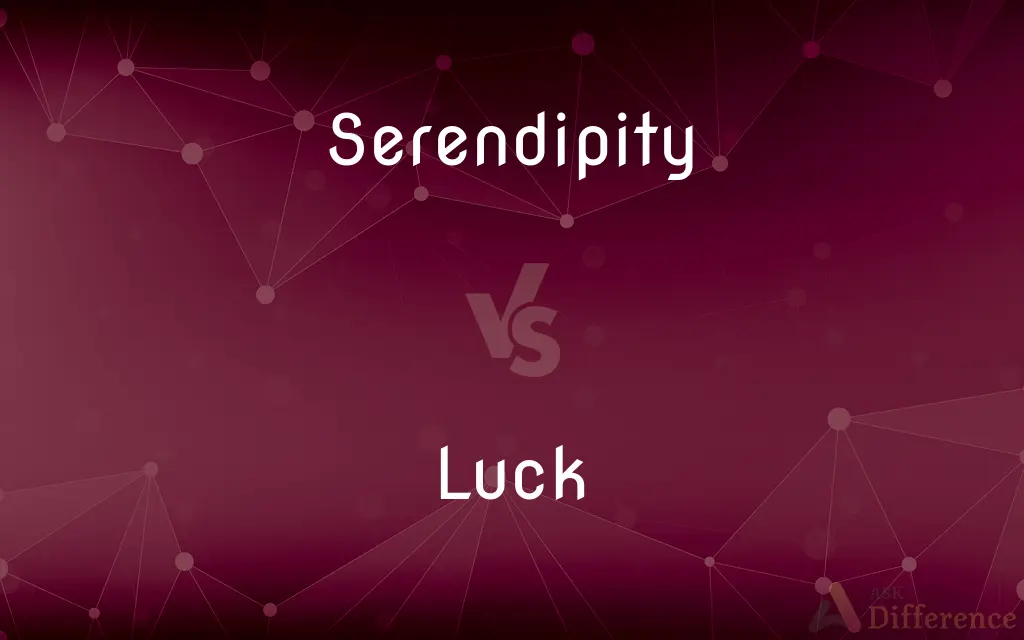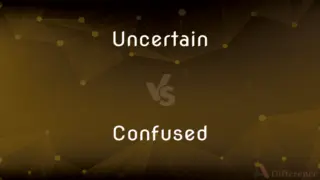Serendipity vs. Luck — What's the Difference?
By Tayyaba Rehman & Fiza Rafique — Published on October 8, 2023
Serendipity refers to fortunate discoveries made by accident, while luck is the random force that causes good or bad events.

Difference Between Serendipity and Luck
Table of Contents
ADVERTISEMENT
Key Differences
Serendipity, a word that originated from the old name for Sri Lanka, conveys the idea of stumbling upon fortunate discoveries unintentionally. It's an unexpected pleasant surprise. The emphasis here is on the unexpected nature of the discovery, highlighting that there was no initial intent behind it. It's like searching for a book on a shelf and finding a long-lost letter used as a bookmark.
Luck, on the other hand, is a much broader term that denotes the force or concept responsible for good and bad events that occur seemingly at random. It doesn’t necessarily involve discovery. If someone narrowly avoids a car accident, they might attribute it to good luck, not serendipity.
While both serendipity and luck denote positive outcomes, the process leading to these outcomes sets them apart. Serendipity is about accidental discovery. It implies that something beneficial was found without looking for it. Luck can apply to any situation, discovery or not, where outcomes could go one way or another.
Moreover, luck can be good or bad, whereas serendipity is inherently positive. A streak of bad events might be attributed to bad luck, but one wouldn't use serendipity in a negative context. In essence, while all serendipitous events can be considered lucky, not all lucky events are serendipitous.
Comparison Chart
Definition
Fortunate discoveries made by accident.
A force causing random good or bad events.
ADVERTISEMENT
Origin
Derived from the old name for Sri Lanka.
Common term without specific origin connotation.
Nature
Always positive.
Can be good or bad.
Scope
Involves unexpected discoveries.
Broader, applies to any random event.
Contextual Usage
Often involves findings or discoveries.
Used in a variety of situations and outcomes.
Compare with Definitions
Serendipity
Stumbling upon something beneficial without looking for it.
The scientist's invention was a result of serendipity rather than planned research.
Luck
The force causing events to happen by chance.
She won the lottery; it was sheer luck.
Serendipity
The phenomenon of making fortunate discoveries accidentally.
He found his childhood photo album while searching for a textbook, a perfect example of serendipity.
Luck
An external factor influencing outcomes without human intervention.
The rain on their wedding day was just bad luck.
Serendipity
A happy accident leading to a favorable outcome.
Their chance meeting at the bookstore was pure serendipity.
Luck
Success or failure apparently brought about by chance.
He got the last concert ticket by luck.
Serendipity
Unexpected positive occurrences without deliberate intent.
Discovering the cure while researching something else was serendipity.
Luck
The chance happening of fortunate or adverse events; fortune
They met one day out of pure luck.
Serendipity
A fortuitous event marked by joyous discovery.
The artist's most famous piece was born out of serendipity.
Luck
Good fortune or prosperity; success
We wish you luck.
Serendipity
The faculty of making fortunate discoveries by accident.
Luck
One's personal fate or lot
It was just my luck to win a trip I couldn't take.
Serendipity
The fact or occurrence of such discoveries.
Luck
To gain success or something desirable by chance
Lucked into a good apartment.
Lucked out in finding that rare book.
Serendipity
An instance of making such a discovery.
Luck
Something that happens to someone by chance, a chance occurrence, especially a favourable one.
The raffle is just a matter of luck.
Sometimes it takes a bit of luck to get success.
I couldn't believe my luck when I found a fifty dollar bill on the street.
Gilbert had some bad luck yesterday — he got pick-pocketed and lost fifty dollars.
Serendipity
A combination of events which have come together by chance to make a surprisingly good or wonderful outcome.
Luck
A superstitious feeling that brings fortune or success.
He blew on the dice for luck.
I wish you lots of luck for the exam tomorrow.
Serendipity
An unsought, unintended, and/or unexpected, but fortunate, discovery and/or learning experience that happens by accident.
Luck
Success.
I tried for ages to find a pair of blue suede shoes, but didn't have any luck.
He has a lot of luck with the ladies, perhaps it is because of his new motorbike.
Serendipity
The occurrence and development of events by chance in a happy or beneficial way.
Luck
The results of a random number generator.
Serendipity
Good luck in making unexpected and fortunate discoveries
Luck
To find something through good fortune; used with into, on, onto or upon.
Luck
That which happens to a person; an event, good or ill, affecting one's interests or happiness, and which is deemed casual; a course or series of such events regarded as occurring by chance; chance; hap; fate; fortune; often, one's habitual or characteristic fortune; as, good, bad, ill, or hard luck. Luck is often used by itself to mean good luck; as, luck is better than skill; a stroke of luck.
If thou dost play with him at any game,Thou art sure to lose; and of that natural luck,He beats thee 'gainst the odds.
Luck
Your overall circumstances or condition in life (including everything that happens to you);
Whatever my fortune may be
Deserved a better fate
Has a happy lot
The luck of the Irish
A victim of circumstances
Success that was her portion
Luck
An unknown and unpredictable phenomenon that causes an event to result one way rather than another;
Bad luck caused his downfall
We ran into each other by pure chance
Luck
An unknown and unpredictable phenomenon that leads to a favorable outcome;
It was my good luck to be there
They say luck is a lady
It was as if fortune guided his hand
Luck
Good fortune or prosperity determined by chance.
His business took off out of pure luck.
Luck
A random event leading to good or bad results.
The team attributed their victory to skill, not luck.
Common Curiosities
Can luck be negative?
Yes, luck can be both good and bad.
Is serendipity always positive?
Yes, serendipity always has a positive connotation, indicating fortunate discoveries.
Is luck controllable?
Luck, by definition, is random and not controlled, though people often try various means to influence it.
Can luck be predicted?
Luck is random by nature and cannot be accurately predicted.
Can animals experience luck?
While animals can experience random favorable or unfavorable events, the concept of luck is human-made.
Is serendipity a skill?
No, serendipity is an event, not a skill. However, being observant can increase chances of recognizing fortunate occurrences.
Can someone "create" serendipity?
By definition, serendipity is accidental, but one can create conditions favorable for unexpected positive outcomes.
How do cultures view luck?
Different cultures have various beliefs, rituals, and symbols associated with attracting or repelling luck.
Does everyone experience serendipity?
While anyone can experience serendipity, its recognition often requires mindfulness and awareness.
Does serendipity always involve discovery?
Primarily, yes. Serendipity usually involves stumbling upon something beneficial unexpectedly.
Is every serendipitous event a result of luck?
While serendipitous events are lucky, not all lucky events are serendipitous.
Is serendipity common in research?
Many scientific discoveries have been the result of serendipity, though it's not a method to rely on.
Is luck related to destiny or fate?
Some believe luck is predetermined by destiny or fate, while others view it as random occurrences.
Can one event be both serendipitous and lucky?
Yes, a fortunate accidental discovery (serendipity) is inherently lucky.
Why is serendipity associated with Sri Lanka?
The term originated from "Serendip," an old name for Sri Lanka, from a tale of fortunate discoveries.
Share Your Discovery

Previous Comparison
Primary Group vs. Secondary Group
Next Comparison
Uncertain vs. ConfusedAuthor Spotlight
Written by
Tayyaba RehmanTayyaba Rehman is a distinguished writer, currently serving as a primary contributor to askdifference.com. As a researcher in semantics and etymology, Tayyaba's passion for the complexity of languages and their distinctions has found a perfect home on the platform. Tayyaba delves into the intricacies of language, distinguishing between commonly confused words and phrases, thereby providing clarity for readers worldwide.
Co-written by
Fiza RafiqueFiza Rafique is a skilled content writer at AskDifference.com, where she meticulously refines and enhances written pieces. Drawing from her vast editorial expertise, Fiza ensures clarity, accuracy, and precision in every article. Passionate about language, she continually seeks to elevate the quality of content for readers worldwide.












































